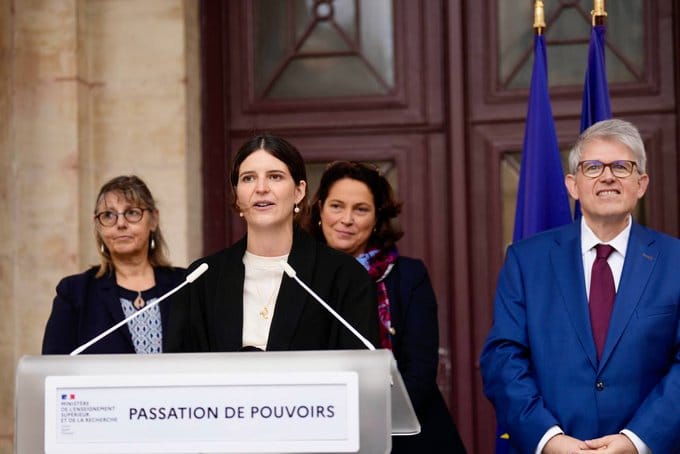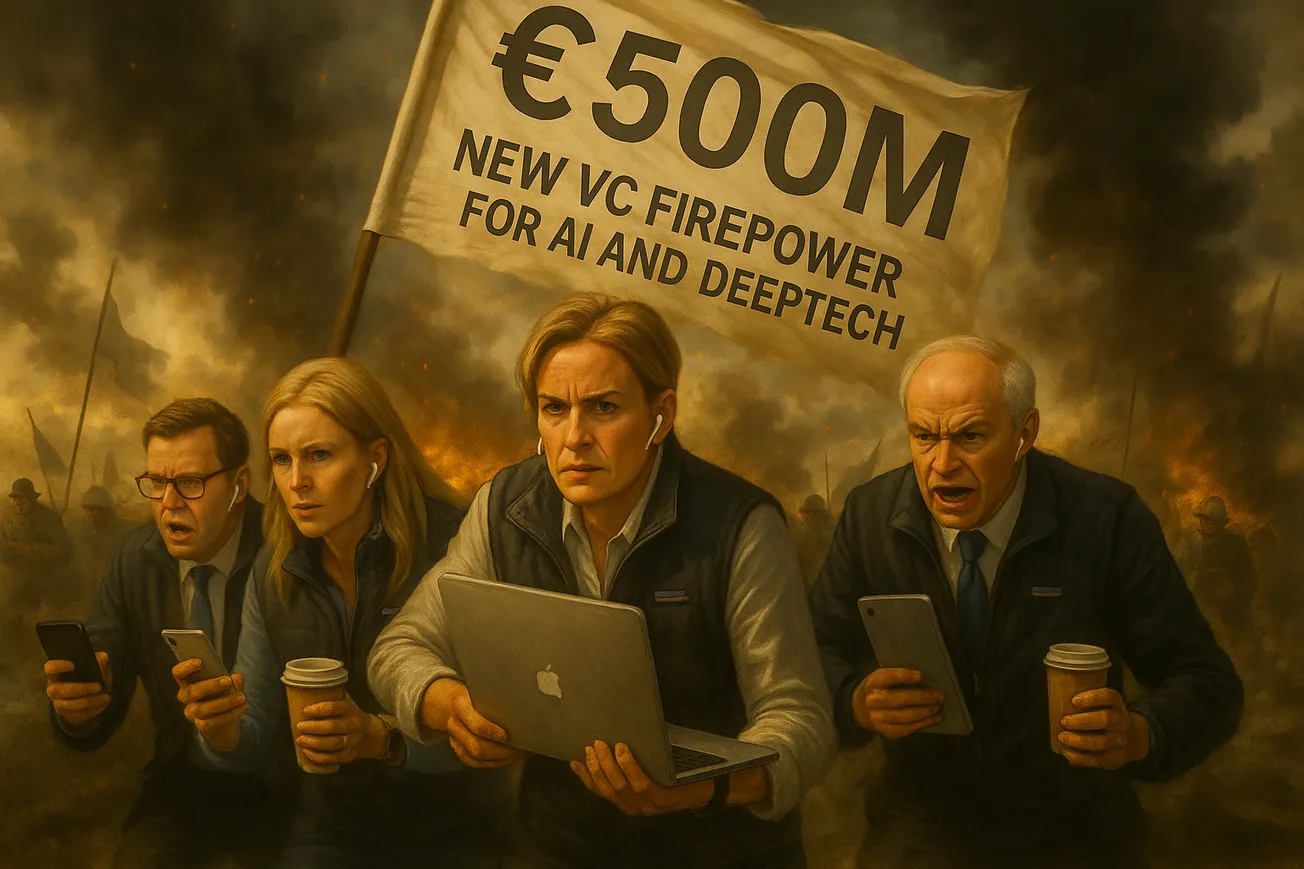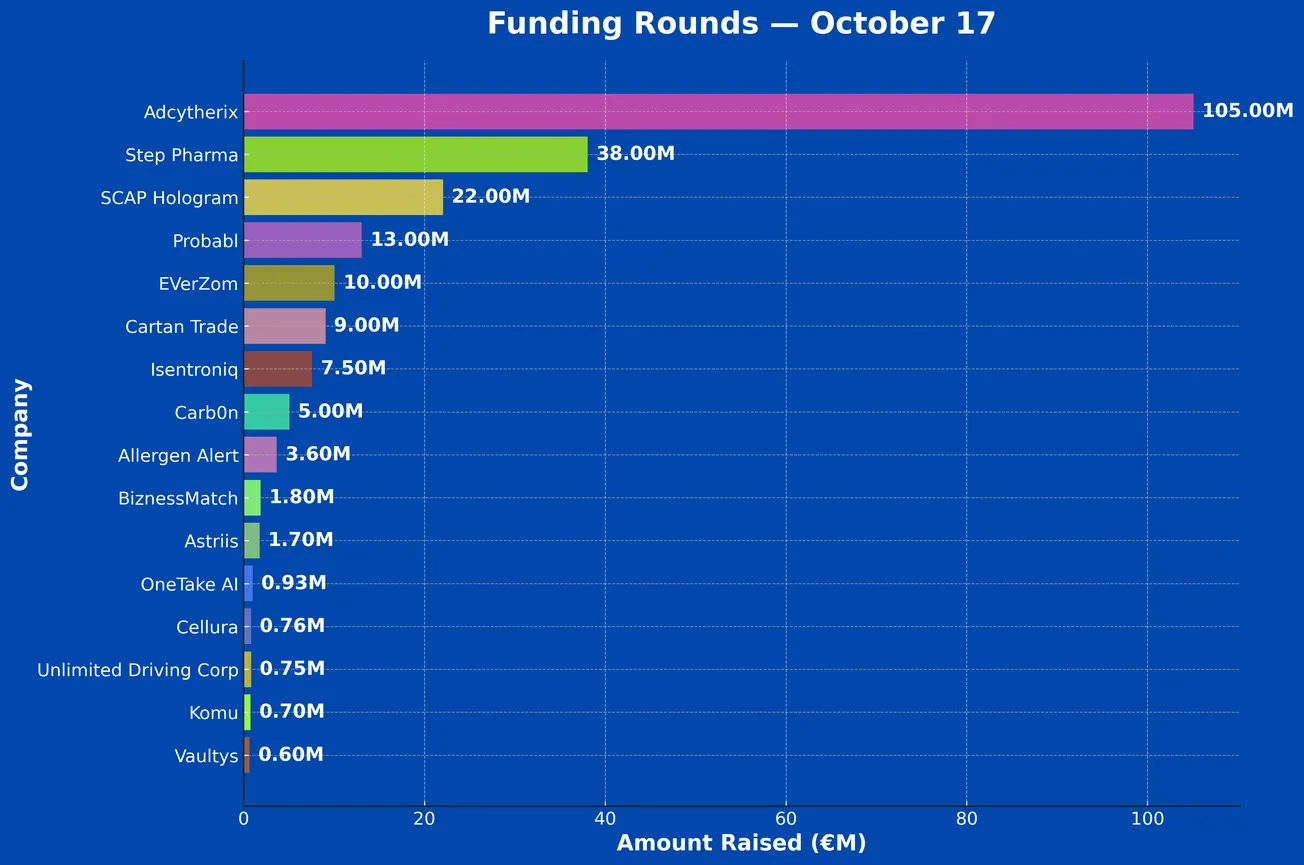Where to follow us:
Welcome...
👋 ... After months of French tech fretting, there is some relief that a new government has at last been named. But those announcements came with one more plot twist.
Clara Chappaz, who just finished a three-year run as head of La French Tech mission, was named France's new Digital + AI Minister (Secrétariat d’État chargé de l’Intelligence artificielle et du Numérique). Before taking charge of La French Tech mission in 2021, Chappaz worked in Asia with various e-commerce start-ups. In 2018, she earned an MBA from Harvard. She then joined Paris-based Vestiaire Collective, the platform for selling and purchasing second-hand luxury goods, as commercial director.

Having a familiar face will certainly reassure the nation's tech ecosystem which had been wondering about the implications of the new government in terms of support for innovation and startups.
Still, there were several notable aspects to the announcement:
👉 Chappaz will be France's first Secretary of AI.
👉 The role has been moved out of the Ministry of Economy and into the Ministry of Higher Education and Research.
👉 The new Prime Minister has been stressing the need for budget cuts. The new minister of Higher Ed. + Research – Patrick Hetzel – has long been arguing that research in France is massively underfunded, causing a "brain drain."
Final decisions are still being made for the next La French Tech mission director.
In her first public remarks on the new gig this week, Chappaz said the new role signals the emphasis the government is putting on AI in terms of the nation's economy and society.
“AI will take on a very special place in my work,” she said.
How the nation's AI agenda will change is less clear. Meanwhile, the larger takeaways for French startups and innovation remain a bit fuzzy: Massive new investment or budget cuts? Will the new French Tech director still report to the Digital Minister, or will he or she remain attached to the Economic Minister?
"France is in the global race of artificial intelligence, and we are now recognized as such," Chappaz said. "But this is a fast-moving race, and we need to keep up by continuing to train the best engineers, our best researchers, and, of course, by helping them to launch their companies."
Listen to her full remarks here (with English subtitles):
A reminder that these newsletters are free, but full access to all content is reserved for paid subscribers. Here are a few ways you can show your support:
- Tips: We've enabled a new feature that allows you to make a one-time tip. The suggested amount is €25, but you can adjust that up or down to whatever suits your budget. 🏆
- Subscribe: Sign up for a monthly subscription and use this link to get a €5 discount on the €10 monthly subscription for your first year. 💁♂️💁♀️
- Sponsorships: We're actively seeking sponsors interested in getting their brands in front of our global audience of readers who are focused on the French tech ecosystem. Reach out to me (chris@frenchtechjournal.com) or Helen (helen@frenchtechjourna.com) for details and a sponsorship kit. 😉🥂
🔎 Inside this week's newsletter:
- Deep Dive: Quantum startup C12 wants to lead the next computing revolution. But can it build a business to sustain itself until Quantum Computing becomes a reality? Co-founder and CEO Pierre Desjardins explains how the company intends to navigate the complicated path between science and business.
- Spotlight Interview: Antoine Guyot, CEO and co-founder of nuclear startup Jimmy, discusses the current renaissance of nuclear power: "France has one of the strongest nuclear industries in the world, and now, with government backing, we feel lucky to be in this new era of nuclear innovation."
- Startup Of The Week: Flaash is an early-stage startup that is bootstrapping an AI-native business by focusing on the real estate market. Flaash co-founder and CEO Jean Mulin breaks down the strategy.
- The Big Deals: Alan, AKUR8, Green Corp Konnection.
- Hot Seed Deals: May, Probable AI, InSpek.
Tech Talk
⬆️ 💸 After a sleepy summer funding season, two big rounds delivered a jolt. First, Akur8 raised a $120m Series C for its AI-powered actuarial platform for insurance companies. Even more surprising was Insurtech unicorn Alan's announcement that it had bagged a €173m Series F at a €4bn valuation, thanks in no small part to its use of GenAI. With this kind of AI heat, no wonder Open AI is opening an office in Paris. 💻
⬇️ 🚗 Meanwhile, the road remains rocky for other high-profile scale-ups. Fintech unicorn Spendesk is scaling down with plans underway to whack 151 jobs in France, the UK, Spain, and Germany. That's about 25% of the workforce, according to Les Echos. 🪓
⬇️ 🐛 ...And Ÿnsect has sought court protection to reorganize its finances as it struggles to raise the additional funding it needs to complete work on its mega industrial farm for raising and processing insects as a source of alternative protein. 😫
⬆️ ☀️ The news is a bit brighter for Back Market, the refurbished gadget platform, which went through its own lean times when it slashed 13% of its jobs two years ago. The company recently announced that it expects to be profitable in Europe this year, and a new partnership with Playstation will help keep the momentum going. ♻️
Deep Dive:
C12 Bets On Carbon Nanotubes For Next-Gen Computing

C12 is among France's most promising quantum computing startups. Founded in 2020 by twin brothers Pierre and Matthieu Desjardins, the company has set its sights on developing large-scale, fault-tolerant quantum computers using carbon nanotubes — a material they believe will overcome the limitations of silicon.
Last year, the company opened its new testing lab in the heart of Paris at a ceremony attended by local and national government officials. Over the summer, C12 raised a new VC round of €18 million.
The company envisions a future where quantum computers are a mainstream tool for solving some of the world's most complex problems. While that promise will take time to be realized, Pierre said large enterprise customers are increasingly exploring the embryonic technology to understand its implications. C12 intends to build a business around helping them prepare for that transition in the short term while accelerating its research to build a commercial-ready quantum computer.
"We have seen in the last few months that these companies want to talk to us to start understanding how this technology will impact their business," Pierre said. "More and more customers would like to invest in this technology. They know that it will take some time. They know it's not a technology that will be produced tomorrow. But they have the right mindset."
Spotlight Interview:
Jimmy CEO Antoine Guyot On The New Nuclear Age

Jimmy is a French nuclear startup that aims to provide industrial heat by utilizing small nuclear reactors. These reactors, termed "Thermal Generators," offer a decarbonized solution for industrial processes, with the promise of being cheaper than traditional fossil fuel-based methods.
Jimmy focuses on efficient execution, leveraging proven technologies to build reactors. The company has raised substantial funds from both private investors and the French government as part of the France 2030 initiative, positioning it as a leading innovator in the nuclear sector.
The startup's progress comes as technologies such as GenAI have abruptly changed the conversation around global energy consumption. The power-hungry technology is leading to a surge in data center construction and a race to secure power to run them.
While nuclear power had fallen out of economic and political favor, politicians and business leaders are now rethinking the role nuclear energy could play in providing the volume of energy needed while still meeting decarbonization targets. That includes France where the government announced an ambitious program in the summer of 2023 to catalyze nuclear innovation.
I spoke with Jimmy's co-founder Antoine Guyot about the company's strategy and his views on nuclear comeback.
Seed Of The Week: Flaash

Since the launch of ChatGPT in November 2022, France has experienced a surge in generative AI startups. A study by France Digitale and Sopra Steria published last spring reported around 600 French AI startups, and with new offerings emerging monthly, that number has likely grown significantly.
Flaash is one such AI-powered startup. Recognizing the immense potential of today’s AI-driven landscape, Flaash harnesses generative AI specifically for the real estate sector while also integrating it into every aspect of its operations — from business development to product creation and customer engagement.
By effectively leveraging AI as a business opportunity and to improve operational efficiency, Flaash serves as an intriguing case study: as AI capabilities advance and drive business innovation, are we witnessing a fundamental shift in our approach to entrepreneurship itself?
Flaash co-founder and CEO Jean Mulin explains how he and his co-founders are pioneering a new breed of fully AI-driven business that may soon become the norm.
"AI enables me to do the work of three or four people,” Mulin said. “It’s a performance booster. When you’re in tech, speed and impact are everything. AI allows us to move faster and deliver more.”
The Big Deals


What: Alan, a digital health insurance company.
Why: To revolutionize health insurance by focusing on user experience with excellent price-quality ratio health plan.
Funding: €173 million
Who: Co-Founders Jean-Charles Samuelian-Werve & Charles Gorintin
Investors: Lakestar, Temasek, Coatue Management, Ontario Teachers’ Pension Plan, and Belfius.
What's next: The new funding will be used to fuel Alan's international expansion and develop new tools as part of its offering.

What: AKUR8, an insurance pricing and reserving platform.
Why: To inject game-changing speed, performance, and reliability into insurers’ pricing and reserving processes.
Funding: €109 million
Who: Co-Founders Brune de Linares & Samuel Falmagne
Investors: Partners Group, One Peak Partners, Guidewire Software
What's next: The fresh cash will go towards accelerating the growth of its product portfolio and fuel its growth in key global markets.

What: Green Corp Konnection, a group of 8 different mobility & energy tech companies.
Why: To accelerate the decarbonization of transport.
Funding: €50 million
Who: Co-Founders Guerlain Chicherit & Éric Boudot
Investors: Shift4Good
What's next: The funding will go towards expanding its production to an industrial scale (with five operational sites), to continue its R&D activities, and to grow internationally.
Hot Seed Deals


What: May, a pregnancy and early childhood app.
Why: To provide professional responses to all parental questions from pregnancy through to pre-school.
Funding: €4.9 million
Who: Co-Founders Cécilia Creuzet, Antoine Creuzet & Adrien Brunet
Investors: Eurazeo, Ring Capital
What's next: The new funding will be used to fuel the startup's international expansion.

What: Probabl, the official operator of scikit-learn, a library of machine learning utilities in Python for data scientists
Why: to enable everyone to master data science through reliable and innovative tools
Funding: €5.5 million
Who: Co-Founders Yann Lechelle & Arnaud Muller
Investors: Mozilla Ventures, Apertu Capital, Bpifrance, Business Angels
What's next: the new cash in convertible bonds will help fuel the company’s growth.

What: InSpek, phototonic sensors for use in bioprocessing.
Why: To monitor bioprocesses (frequently used in the pharmaceuticals, agriculture, fuels, and chemical industries) in real-time without sampling, thus making processes faster, more accurate, and more environmentally friendly.
Funding: €3.5 million
Who: Co-Founders Jérôme Michon, Juejun Hu, Laurent Vivien, and Derek Kita
Investors: Breega, Wind & Quantonation
What's next: The new funding will be used to further the startup's R&D efforts including work on an all-in-one sensor and to fuel the company's expansion in Europe and abroad.
👋🏻 If you’re enjoying The French Tech Journal, support the project by forwarding it to friends and sharing it on your social networks. You can also comment on this post. And if you have ideas for stories, tips, or just want to harass us, shoot us an email: chris@frenchtechjournal.com / helen@frenchtechjournal.com 👋🏻








